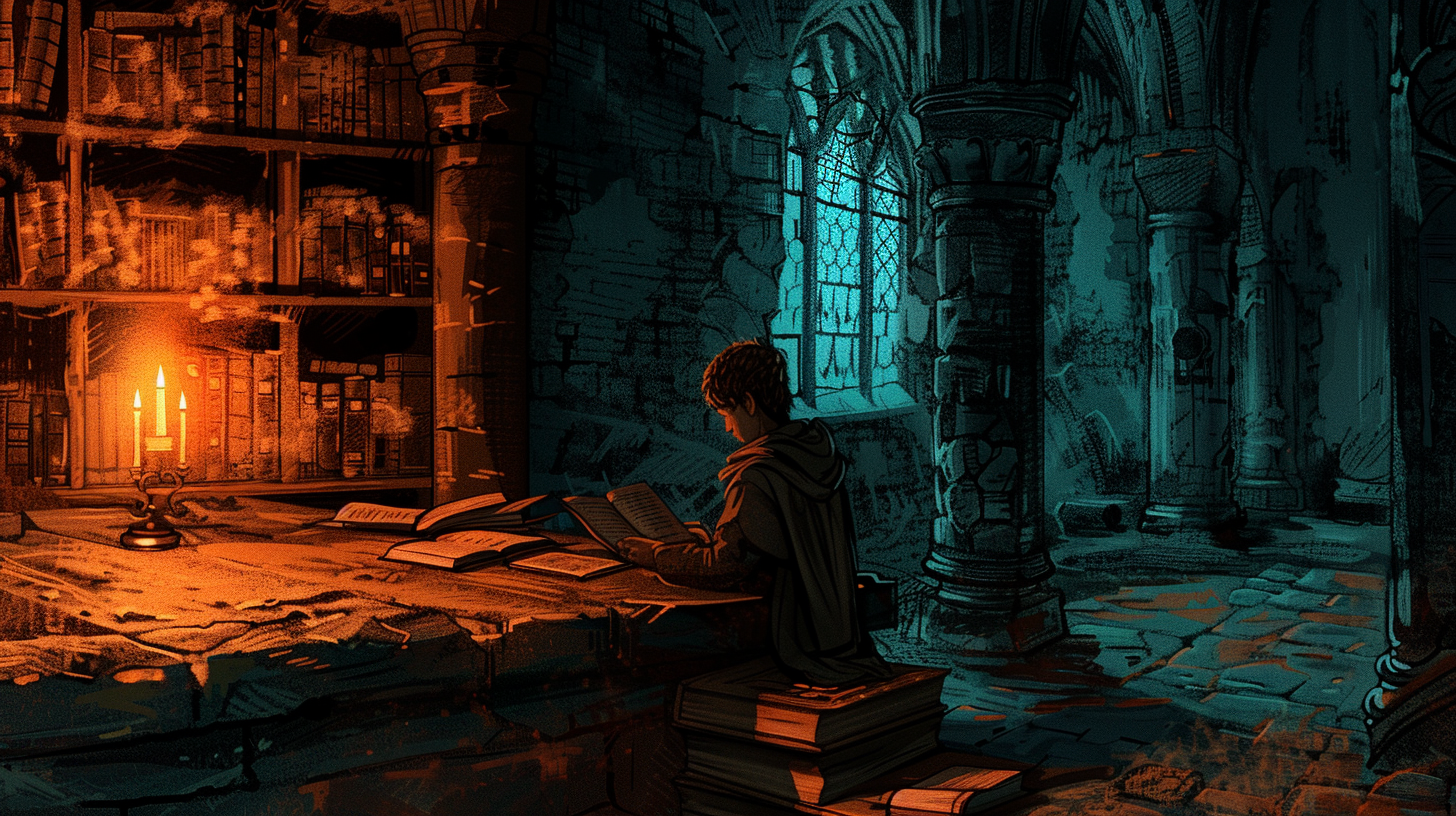Are you in the early stages of education or a career? Perhaps you have children of your own navigating their way into an unknown future, feeling a bit lost in the maze of life's possibilities. Maybe you're grappling with the pressure of making the right choices for your future, all while trying to understand who you really are and what you genuinely want. No matter your age, those questions should never fade, or you're not living! What if there was a way to navigate these formative years with a sense of direction and purpose, using the wisdom of some of history’s greatest minds? Perhaps the secret to mastering your early years and setting the foundation for a fulfilling life lies in viewing this period as an apprenticeship, a time for learning, experimenting, rebelling, and growing.
Our society often emphasizes the "rapid achievement" of success, but what if, by speed-reading our way through life, we're missing out on deeper learning and transformation? We need to learn the art of reading between the lines instead of skimming the surface. What if we consider our early experiences in life as a form of apprenticeship, much like the great masters of the past? So we're going to align two different perspectives: the personal framework I discussed in a recent article on life's 3 key phases, and the profound lessons on mastery and apprenticeship from Robert Greene's 'Mastery'.
TL;DR - Don't want to read the rest? Watch on YouTube or Listen on Podcast!
My Framework: Read. Write. Execute.
In my recent article, I categorized life into three major phases: Read (0-25 years), Write (25-45 years), and Execute (45+ years). Each stage corresponds not just to our personal development but also to the evolution of the internet— from Web1's consumption to Web3's creation and ownership. This framework isn't just a metaphor; it's a guide for navigating each phase of life with intention and mastery.
We're going to focus today on Phase 1.
Phase 1: The Apprenticeship (0-25 Years)
This initial phase is all about learning and absorbing, much like the 'Read' permissions in the Unix operating system where I've named this framework from, or the 'Read' era of the internet (or Web1). It's a time for gathering data, experiencing life, and experimenting within a 'practice mode' for the future. Our early years are our apprenticeship in life, where we lay the foundations for all that follows.
Drawing from Mastery, Greene highlights that this period is crucial for deep, transformative learning. He points out that many of history's great masters underwent a lengthy period of apprenticeship, quietly developing their skills. This is our time to explore, to engage with our primal curiosities, and to start understanding our unique strengths and gifts.
Learning from the Masters
Let's take a series of inspiring quotes and lessons from Greenes 'Mastery' to see how this apprenticeship phase is pivotal in shaping our mastery over life.
Embrace Your Unique Path: Just as Greene emphasizes the importance of following one's unique calling, our early years should be about discovering what sets us apart. He writes...
"You are a one-of-a-kind combination of strengths, gifts, and talents. Things that no one else has".
This period is your opportunity to explore those gifts and begin honing them.
Deep Observation and Practice: Like Leonardo da Vinci's apprenticeship under Andrea del Verrocchio, we should immerse ourselves in learning from different sources through the art of impartial observation put into repetitive practice. Da Vinci's years of training weren't just about art; they included engineering and mechanics. Taking a holistic and multi-disciplinary appreoach means we start to see how everything is connected and leads to greater discoveries and learning in our own apprenticeship.
Finding Your Calling: Greene recounts the story of Temple Grandin, whose early struggles led her to profound discoveries in animal science. She was diagnosed with autism as a child but defied expectations by becoming a leading animal scientist and advocate for autism awareness. Facing challenges in communication and social interaction, she discovered a profound connection with animals during a visit to her aunt's ranch. Grandin's unique perspective led her to innovate humane livestock handling systems, significantly improving animal welfare. She leveraged her experiences to educate others on autism, showcasing the strengths that can arise from neurodiversity.
Her journey underscores the importance of paying attention to what draws us, even from a young age, and pursuing it with passion. Greene wrote...
"It's not necessarily the most intelligent people that reach mastery, it's often those who are driven at an emotional level".
Primal Curiosity: This phase is about allowing your "primal curiosity" to guide you. What fascinates you? What can you not stop thinking about? Greene suggests that mastery comes from this relentless pursuit of understanding, driven by a deep emotional connection to our interests.
Deliberate Practice: The concept of "Deliberate Practice," that we see in the meticulous studies of Leonardo, teaches us the value of focused and persistent effort. It's about breaking down skills into smaller parts, practicing them, and learning progressively.
3 Phases of Apprenticeship
Robert Greene outlines a three-phase process for mastering any craft through apprenticeship:
Deep Observation: This initial phase involves immersive learning where one observes and absorbs the fundamental concepts of their chosen field. It's about understanding the basics deeply before moving on to more complex tasks.
Acquiring Skills: After grasping the basics, the focus shifts to skill acquisition. This stage is marked by learning the core activities essential for the craft, alongside developing focus and discipline—key attributes in mastering any field.
Experimentation and Flow: With the fundamentals in place, the apprentice now experiments, combining learned skills in unique ways. This experimentation leads to a state of flow, where actions become effortless and highly focused, enabling peak creativity and productivity.
Education or Apprenticeship?
Traditional systems of learning are fundamentally misaligned with the apprenticeship model. The traditional education system, with its rigid structure, too often fails to acknowledge the individuality of each student, forcing everyone through the same standardized path. This approach not only stifles creativity and personal growth but also ignores the diverse talents and interests that students bring to the table. It's a system that rewards conformity over curiosity, memorization over understanding, and compliance over critical thinking.
Jordan Peterson, a vocal critic of modern education practices, echoes these sentiments. He once said...
"The primary reason to educate young people is to arm them with the capability to articulate themselves in the world."
This emphasizes education's role not only to impart knowledge but to empower individuals to think, communicate, and argue effectively. It's about equipping students with the tools to navigate life's complexities, to defend their ideas and beliefs, and to engage in the societal discourse that shapes our world. This harks back to Phase 2 in my personal framework where we start to engage in more meaningful ways in the world, much like the Web2 era of the internet where we not only consumed content but could interact through chat and forums.
Weaponize your Words
This brings us to the power of mastering both written and spoken words. In the context of the 'Read' phase of life and beyond, learning to write and speak with clarity, precision, and persuasion is to learn a form of superpower. It's the ultimate weapon in the game of life, allowing us to influence, to lead, and to leave an indelible mark on the world. Writing is not just a method of communication but a tool for thinking. It's a way to structure our thoughts, to analyze and synthesize ideas, and to bring clarity to complex issues. Speaking, on the other hand, is how we share those ideas, inspire action, and connect with others on a profound level. Together, these skills form the cornerstone of true education. They are the essence of what it means to be educated and the foundation on which mastery is built.
The Apprenticeship’s Purpose
The early years of our life, seen through the lens of an apprenticeship, are not just about preparing for the future. They're about building a foundation of knowledge, skills, and self-awareness that will serve us throughout life.
Just as every master was once an apprentice, your journey through these early years is an important step in shaping a life of meaning and impact.
So, take time to explore, to learn, and to grow. The path of apprenticeship, no matter what stage of life you're at, will shape the superuser you become.


